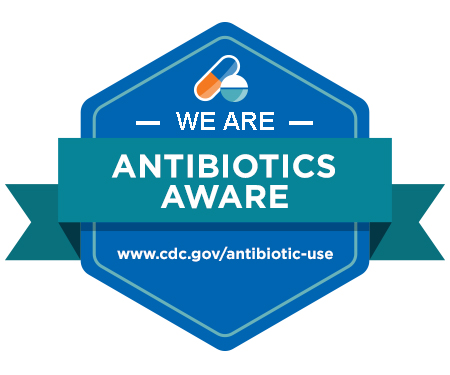Mile Bluff recognized for accomplishments in antibiotic stewardship
- Category: News
- Posted On:
 As fall sets in, so does cold and flu season. To remain as healthy as possible, be sure to receive all recommended vaccinations. When you are sick, only use medications when needed, and always use medications as directed.
As fall sets in, so does cold and flu season. To remain as healthy as possible, be sure to receive all recommended vaccinations. When you are sick, only use medications when needed, and always use medications as directed.
When you have a virus like influenza or a cold, it’s easy to think that an antibiotic is the solution to your illness. This is when many turn to healthcare providers to request a prescription. However, there are many times an antibiotic is not only ineffective, but could actually be harmful. This is where antibiotic stewardship comes in.
Antibiotic stewardship is the practice of using antibiotics only when they are needed, using the correct antibiotic for the infection being treated, and using antibiotics only as long as they are needed to effectively treat an infection. You may think that this sounds simple and that healthcare providers have been following this practice, but that hasn't always been the case.
The fact is, providers throughout the nation have prescribed antibiotics when they're not necessary, because it's the expectation of the patient. There is the common misconception that if you're sick, you always need an antibiotic to feel better. There are many times antibiotics are not the answer, and the healthcare community has discovered that prescribing antibiotics when not needed can lead to problems down the road.
Antibiotic stewardship efforts began in 2006 when the Center for Disease Control and Prevention (CDC) identified tuberculosis bacteria that were not able to be treated successfully with antibiotics as they once had been. It was discovered that the over-use of antibiotics had allowed the bacteria to build up resistance to the medication. The CDC predicted that if changes were not made to the way antibiotics are prescribed, issues with being able to treat other bacteria would arise. Unfortunately, those predictions have started to become a reality across the country.
The good news is, high levels of resistance have not been reported at Mile Bluff. This is a credit to those providing medical care in the community; providers have managed antibiotic use and bacterial resistance very well. In fact, earlier this year each of Mile Bluff’s clinics and its emergency department were recognized by the CDC, Medicare and MetaStar for accomplishments in antibiotic stewardship over the past few years.
Antibiotics are generally helpful for fighting bacteria, not viruses. Common illnesses that are effectively treated with antibiotics include whooping cough, strep throat and urinary tract infection. Many other common infections are viral, and do not respond to antibiotics. These viruses include sore throats, sinus infections, colds, ear infections, etc. When an antibiotic is not prescribed, don’t push for one. Instead, ask your healthcare provider for tips on how to relieve your symptoms so that you can feel better as you heal.
There are things you can do to decrease the chance of getting and spreading infections. These include eating right, drinking plenty of appropriate fluids, getting enough rest, washing your hands frequently, staying up-to-date with age-appropriate vaccines, and avoiding others who are sick.
If you have questions about an infection and how best to treat it, or if you would like to learn how to further prevent infection with vaccines or other recommendations, please see your primary care provider. To learn more about antibiotic stewardship, visit www.cdc.gov/getsmart. Stay healthy this cold and flu season.

